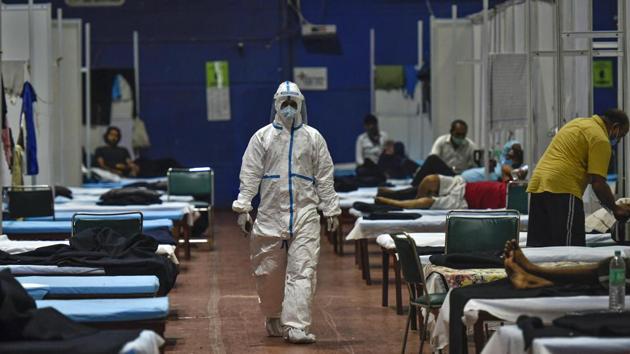‘Reserve 80% ICU beds for Covid patients’: Delhi govt to private hospitals
The total number of hospitalisations stood at 6,503, according to the daily health bulletin released by the Delhi government on Sunday. This has overshot the highest number of hospitalisations – just over 6,200 - Delhi had seen during the surge in cases in June.
With the number of hospitalisations of patients with coronavirus disease (Covid-19) on the rise, hospitals in Delhi have started running out of intensive care unit beds. Only 35% of the total 2,201 ICU beds earmarked for the treatment of Covid-19 patients across hospitals remain vacant as on Monday morning, according to the Delhi Corona App. With this in mind, the Delhi government yesterday ordered 28 big private hospitals to reserve 80% of their total ICU beds for Covid-19 patients.

The total number of hospitalisations stood at 6,503, according to the daily health bulletin released by the Delhi government on Sunday. This has overshot the highest number of hospitalisations – just over 6,200 - Delhi had seen during the surge in cases in June.
Those in hospitals account for only about 22% of the total number of active cases or those still living with the infection in Delhi.
The government had set up a committee in the beginning of June to assess the need for hospital beds. Based on the trends then, the committee had predicted that Delhi would need 15,000 beds by the end of June and 42,000 by mid-July. However, the numbers started declining in June-end.
The government, in the meantime, had ramped up its bed capacity to over 15,000 and slowly started bringing it down in August when the number of new cases as well as hospitalisations saw a dip. Currently, Delhi has 14,397 beds earmarked for the treatment of Covid-19 patients across hospitals – both government and private. Of these, only 15% beds are in the intensive care units and are either with or without ventilators.
To increase the number of ICU beds, the government had first directed its own hospitals - Lok Nayak, Guru Teg Bahadur, and Rajiv Gandhi Super Speciality Hospital - to scale up the number of ICU beds. The three hospitals currently have 600 ICU beds of which almost 48% remain vacant.
It is the big private multi-speciality hospitals that are running out of ICU beds, about 85% of the ICU beds in these hospitals are currently occupied.
“You see, the patients who had been delaying their surgeries and other planned procedures have started visiting the hospitals in the last one month, with most of the big private hospitals running at 90% of their total ICU capacity. If you look at the statistics from these bigger hospitals in the last three months, they received about 2.5 times non-Covid patients than Covid patients. This means the government would be jeopardising the lives of these non-Covid patients,” said Girdhar Gyani, director general of the Association of Healthcare Providers (India).
“Apart from that, this move is also penalising the private hospitals economically. When they say 80% of the ICU beds have to be reserved, it means the beds have to be reserved even if there aren’t any Covid-19 patients. But, the government would not be paying the hospitals. It is one thing to say, reserve 500 beds and we will pay for it. Besides, why should ICU beds be kept vacant when someone else might need it,” said Gyani.




